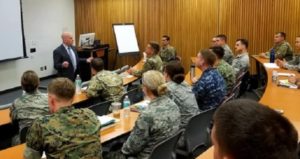Effort Likely Was Related to Budget Disputes

Richard Thomas, MD, DDS, president of the Uniformed Services University of the Health Sciences (USUHS), welcomes new students. USU photo.
BETHESDA, MD — In what would be a futile parting during the final days of President Donald Trump’s administration, DoD officials advocated for the firing of Richard Thomas, MD, DDS, president of the Uniformed Services University of the Health Sciences.
The move drew the ire of Maryland legislators, who wrote to Acting Secretary of Defense Christopher Miller asking him to reconsider the possible dismissal and argued that it appeared to be retaliation for Thomas’ recent criticism of DoD’s plans to defund the university.
U.S. Sens. Chris Van Hollen and Benjamin Cardin, both Democrats, sent the letter on Jan. 8, expressing their “deep concern at the effort to remove” Thomas, who is an Army major general.
“We understand that the under secretary of defense for personnel and readiness has recommended his dismissal and that Dr. Thomas will have an opportunity to present a defense on Monday, Jan. 11,” the legislators wrote. “The fact that this action is taking place despite the strenuous objections of the USU Board of Regents raises serious questions about its basis and whether it is retaliatory in nature.”
The senators added, “His removal at this particular time appears to be retribution for his advocacy on behalf of military medicine.”
The meeting to discuss Thomas’ removal was postponed, and the subsequent change in DoD leadership make it unlikely that it will be rescheduled. It does highlight, however, what had developed into a sizable rift between DoD leaders under the Trump administration and the man tasked with stewarding one of the main pipelines for physicians entering the military.
News of Thomas’ possible firing first broke on Politico in December when it obtained a copy of the proposed removal signed by Assistant Secretary for Health Affairs Thomas McCaffery. According to the news outlet, the document cited Thomas’ handling of a subordinate as it concerned a case of plagiarism as reason for his proposed removal.
According to the Politico story, DoD claimed it was considering firing Thomas because one of his employees, Arthur Kellermann, MD, the dean of the F. Edward Hebert School of Medicine from 2013 to 2020, released personal information about a volunteer adjunct faculty member at the university who was accused of plagiarism.
Growing Budget Tension
As referenced in the senators’ letter, the real reason likely stemmed from growing tension between Thomas and McCaffery, because of efforts to cut resources from the university, however.
In February 2019, Thomas spoke out against DoD’s proposed budget, which recommended cutting 18,000 military medical billets. Such drastic cuts, Thomas argued, would deeply disrupt the pipeline of medical specialists into the military and affect the services’ readiness. The budget that was eventually passed did not rule out such massive personnel cuts but required services to conduct extensive analyses prior to any reductions or realignments.
This wasn’t the only time that year that Thomas had to defend the school’s resources from DoD cuts. In the fall of 2019, DoD’s Cost Assessment and Program Evaluation (CAPE) office led a departmentwide review looking to reduce costs. This resulted in recommendations to cut university operations by 30% and research by 34%. In a letter to university staff, Thomas said he believed DoD was working on flawed information and that the budget cuts could result in the university’s closure.
The cuts were included in early versions of the DoD budget but were removed from the version that was signed into law.
USU was created in 1972 to help combat a nationwide physician shortage—one that disproportionately impacted the military. A 1972 Senate Armed Services Committee report found that DoD’s retention rate for physicians with at least two years of service was approximately 1%. Also, a law authorizing the president to draft a certain number of physicians into the military expired in July 1973.
This led to the creation of the medical school, as well as the Armed Forces Health Professions Scholarship Program. The university’s mandate was to “educate, train and comprehensively prepare uniformed services health professionals, scientists and leaders,” as well as to generally support the readiness of the uniformed services.
Thomas has frequently cited retention rate numbers as proof of the university’s usefulness. Military physicians who train at USU remain in the military longer—15 years compared with nine years.
One concern has been that the cost of training a physician at USUHS has been estimated at $1 million—more than twice that of a physician trained at a civilian medical school. This is only an estimate because, according to a 2018 Government Accountability Office (GAO) report, USU does not adequately track costs for its individual student programs and activities.
The report’s authors suggested that, as long as this knowledge gap exists, DoD will not understand the full funding requirements of USU, resulting in future conflicts between DoD’s proposed budgets and the university’s needs.

